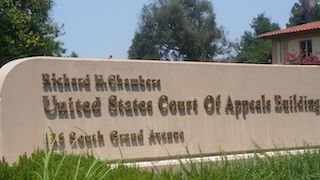As the reader of this article may already be aware, a prisoner bringing a petition for a writ of habeas corpus in federal court under 28 U.S.C. § 2254 may not do so on unexhausted federal claims. In other words, the prisoner must first exhaust all such federal claims in state court before bringing such claims in federal court. Rose v. Lundy (1982) 455 U.S. 509.
Brief Synopsis: The following article concerns state court convictions subject to a petition for writ of habeas corpus in federal court, which traditionally must only argue claims that were exhausted in state court. However, in the following case, the Ninth Circuit ruled that ineffective assistance of counsel can be a reason to allow such a federal petition to be stayed under Rhines v. Weber and to allow petitioner to return to state court to exhaust appeals on such claims.
Traditionally, if a prisoner brought a “mixed petition” for habeas corpus, i.e., one containing exhausted and unexhausted federal claims, the prisoner must abandon his unexhausted claims and only assert the exhausted claims, meaning claims that were previously brought and denied in state court. This requirement to abandon such claims under Lundy came about when there was no statute of limitations on bringing a federal petition for a writ of habeas corpus.
However, this changed in 1996 when the Antiterrorism and Effective Death Penalty Act of 1996 (AEDPA) passed. AEDPA preserved Lundy’s total exhaustion requirement, but imposed a new one-year statute of limitations on the filing of federal habeas petitions after such claims were ruled upon and exhausted in state court. See 28 U.S.C. §§ 2254(b)(1)(A), 2244(d).
Although state court postconviction proceedings toll the limitations period under AEDPA, id. § 2244(d)(2), the pendency of a habeas petition in federal court does not. See Duncan v. Walker (2001) 533 U.S. 167, 181-182.
Consequently, a “perfect storm” can arise that legislators probably never anticipated. A federal habeas petitioner can be trapped between
Lundy’s and the one-year statute of limitations. This trap requires petitioners, to get federal court attention on habeas petitions, to abandon unexhausted claims that may be quite meritorious and without reason why they were unexhausted, in order to pursue their exhausted claims (that may not be meritorious because, after all, the state court denied them).
 U.S. Ninth Circuit Court of Appeals Pasadena
U.S. Ninth Circuit Court of Appeals Pasadena
As many have suggested, there must be some type of exception to allow federal habeas action on unexhausted claims, especially ones that are unexhausted, but meritorious.
The federal habeas petition of Gregory Bolin v. Renee Baker (warden), ruled upon by the U.S. Ninth Circuit Court of Appeals in San Francisco on April 26, 2021 is that new law that some might say establishes such an exception to this trap. It merits mention that while the following case originated in Nevada, it was ultimately ruled upon by the U.S. Ninth Circuit, which also rules on California matters, so its opinion controls for federal claims arising in California.
In 1996, a Nevada jury convicted Bolin of first-degree kidnapping, sexual assault and first-degree murder. The jury sentenced him to death. On direct appeal, the Nevada Supreme court appealed his conviction and sentence. His petition for certiorari to the U.S. Supreme Court was denied. Bolin v. Nevada (1999) 525 U.S. 1179.
Bolin then filed a pro se habeas petition in Nevada state court in April 1999. Pursuant to Nevada law, the state court appointed counsel to represent him. The state court denied his petition and Nevada Supreme Court affirmed in 2007. The U.S. Supreme Court then denied his petition for certiorari in 2008.
Before the U.S. Supreme Court ruled on his state court habeas petition, Bolin then filed a habeas petition in federal district court in Nevada in 2007. In this petition, he raised 55 claims, of which 29 were unexhausted either in whole or in part. The district court held, under Lundy, supra, that Bolin would need to abandon the unexhausted claims or face dismissal of his entire petition.
In response, Bolin argued that there was good cause under Rhines v. Weber (2005) 544 U.S. 269 for his failure to exhaust because his post-conviction counsel had been ineffective for failing to investigate and raise unexhausted claims.
Rhines holds that a federal district court may issue a stay-in-abeyance order “in limited circumstances” in order to permit a petitioner with unexhausted claims to return to state court to exhaust them when: “1) petitioner has good cause for his failure to exhaust; 2) his unexhausted claims are potentially meritorious, and 3) there is no indication that petitioner engaged in intentionally dilatory litigation tactics.” Rhines, at 278.
The district court denied this Rhines claim, stating that Bolin was “bound by the acts of his counsel.” The court further explained that good cause for failure to exhaust required an excuse “outside the control of petitioner and his counsel.” However, the court allowed that a “sufficiently egregious” ineffective assistance of counsel (IAC) claim might “conceivably” support a showing of good cause.
Bolin then appealed to the U.S. Ninth Circuit Court of Appeals in San Francisco, which ruled that the district court applied the wrong standard when it denied Bolin’s Rhines claim. The Ninth Circuit explained that an IAC claim could suffice under Rhines under Blake v. Baker (9th Cir., 2014) 745 F.3d 977, so Bolin’s case was remanded to the district court to apply the proper standard in ruling on Bolin’s Rhines claim.
The citation for the U.S. Court of Appeals for the Ninth Circuit ruling discussed above is Gregory Bolin v. Renee Baker (9th Cir., 2021) 994 F. 3d 1154.
For more information about petitions for writ of habeas corpus, please click on the following articles:
 U.S. Ninth Circuit Court of Appeals Pasadena
U.S. Ninth Circuit Court of Appeals Pasadena